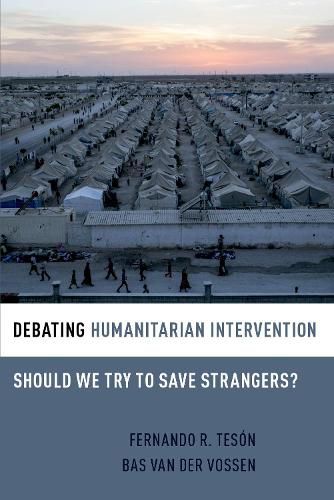Readings Newsletter
Become a Readings Member to make your shopping experience even easier.
Sign in or sign up for free!
You’re not far away from qualifying for FREE standard shipping within Australia
You’ve qualified for FREE standard shipping within Australia
The cart is loading…






When foreign powers attack civilians, other countries face an impossible dilemma. Two courses of action emerge: either to retaliate against an abusive government on behalf of its victims, or to remain spectators. Either course offers its own perils: the former, lost lives and resources without certainty of restoring peace or preventing worse problems from proliferating; the latter, cold spectatorship that leaves a country at the mercy of corrupt rulers or to revolution. Philosophers Fernando Teson and Bas van der Vossen offer contrasting views of humanitarian intervention, defining it as either war aimed at ending tyranny, or as violence. The authors employ the tools of impartial modern analytic philosophy, particularly just war theory, to substantiate their claims. According to Teson, a humanitarian intervention has the same just cause as a justified revolution: ending tyranny. He analyzes the different kinds of just cause and whether or not an intervener may pursue other justified causes. For Teson, the permissibility of humanitarian intervention is almost exclusively determined by the rules of proportionality. Bas van der Vossen, by contrast, holds that military intervention is morally impermissible in almost all cases. Justified interventions, Van der Vossen argues, must have high ex ante chance of success. Analyzing the history and prospects of intervention shows that they almost never do.Teson and van der Vossen refer to concrete cases, and weigh the consequences of continued or future intervention in Syria, Somalia, Rwanda, Bosnia, Iraq, Lybia and Egypt. By placing two philosophers in dialogue, Debating Humanitarian Intervention is not constrained by a single, unifying solution to the exclusion of all others. Rather, it considers many conceivable actions as judged by analytic philosophy, leaving the reader equipped to make her own, informed judgments.
$9.00 standard shipping within Australia
FREE standard shipping within Australia for orders over $100.00
Express & International shipping calculated at checkout
When foreign powers attack civilians, other countries face an impossible dilemma. Two courses of action emerge: either to retaliate against an abusive government on behalf of its victims, or to remain spectators. Either course offers its own perils: the former, lost lives and resources without certainty of restoring peace or preventing worse problems from proliferating; the latter, cold spectatorship that leaves a country at the mercy of corrupt rulers or to revolution. Philosophers Fernando Teson and Bas van der Vossen offer contrasting views of humanitarian intervention, defining it as either war aimed at ending tyranny, or as violence. The authors employ the tools of impartial modern analytic philosophy, particularly just war theory, to substantiate their claims. According to Teson, a humanitarian intervention has the same just cause as a justified revolution: ending tyranny. He analyzes the different kinds of just cause and whether or not an intervener may pursue other justified causes. For Teson, the permissibility of humanitarian intervention is almost exclusively determined by the rules of proportionality. Bas van der Vossen, by contrast, holds that military intervention is morally impermissible in almost all cases. Justified interventions, Van der Vossen argues, must have high ex ante chance of success. Analyzing the history and prospects of intervention shows that they almost never do.Teson and van der Vossen refer to concrete cases, and weigh the consequences of continued or future intervention in Syria, Somalia, Rwanda, Bosnia, Iraq, Lybia and Egypt. By placing two philosophers in dialogue, Debating Humanitarian Intervention is not constrained by a single, unifying solution to the exclusion of all others. Rather, it considers many conceivable actions as judged by analytic philosophy, leaving the reader equipped to make her own, informed judgments.